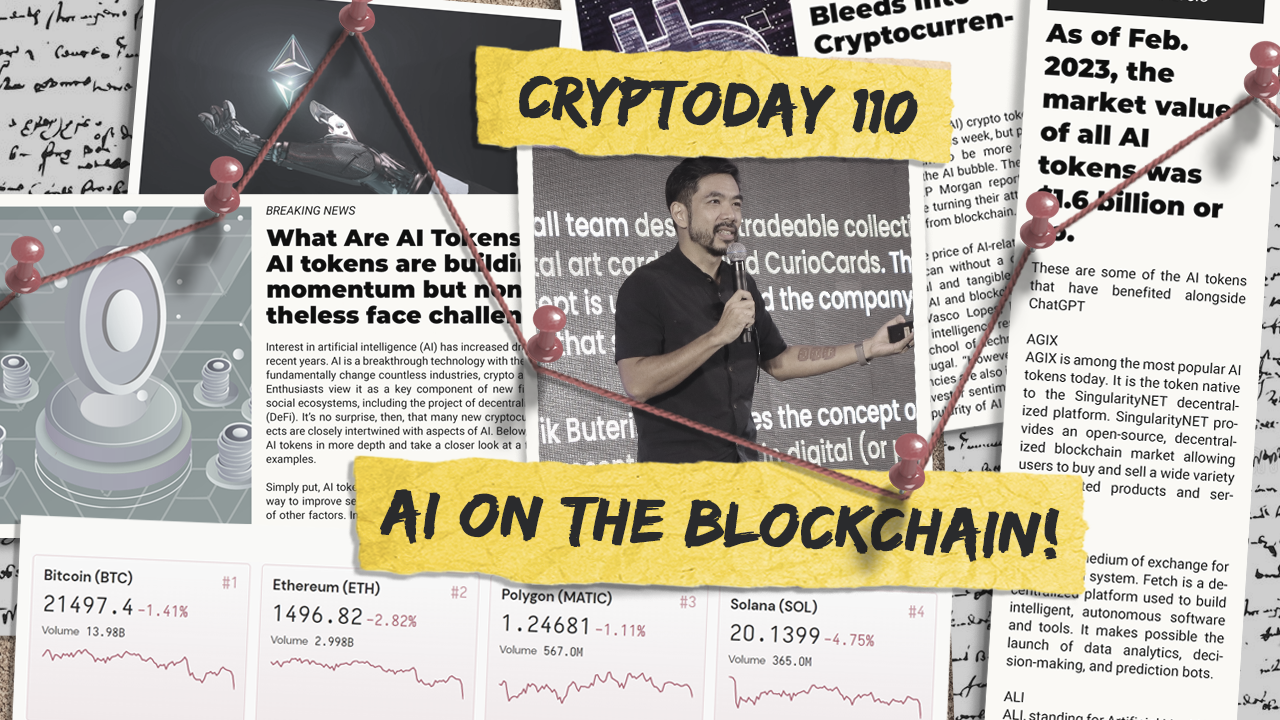AI on the Blockchain!
CRYPTODAY 110
From mid December to late January, the crypto markets have been in a euphoric state of optimism, with $BTC and $ETH up about 50%, buoyed up by signs of interest rate easing from the Fed. This last week has seen some of that positivity deflate, with the crypto market shedding about 8% of its overall marketcap. There’s been a handful of bad news: Kraken’s ETH staking service has been shut down for US customers due to pressure from the SEC. But perhaps most sadly, LocalBitcoins has closed its doors after serving the community since 2013. During the early days of crypto, LocalBitcoins was often the very first platform that enabled trading of any kind in many “frontier” regions like Southeast Asia, Africa, or Latin America. And it was always comforting to know that no matter what happened to me while traveling overseas, I could use LocalBitcoins to quickly convert into local cash in an emergency. (To be fair, Paxful still fulfills that specific need in a lot of countries, but having multiple options is always better.)
Last week we talked about the recent advancements in AI and my personal thoughts on its impact on art. (Recap: it’ll be fine, guys, really.) This week I wanted to look into some AI-focused crypto projects, many of which have been growing rapidly in market value this year. Just last week, Google made a $300M investment in Anthropic, one of the biggest competitors of OpenAI, which itself received a $10B follow-on infusion from Microsoft. So here we are, with crypto AI projects outperforming the market by as much as 3000% in some cases. I’ll admit that I started doing this research with some skepticism, but dive in anyway and see if we can’t learn a thing or two about #cryptoAI!
Founded in 2019, Alethea.ai popularized the “intelligent NFT,” which appears to be a video-based character that uses OpenAI’s GPT3 engine to give it conversational abilities. The genesis edition of it was called Alice, and was auctioned off at Sotheby’s for half a million dollars in 2021. It doesn’t look like Alethea actually develops any of its own AI technology. They’re trying to become the standard protocol for generating animated talking heads that can converse with the user, and then minting those as NFTs. I suppose that you could use this tech to make more lifelike Non-Player Characters (NPCs) in video games, but honestly, most of their demos could be done with off-the-shelf tools and don’t look particularly impressive in 2023. The $ALI token opened the year at $0.01, peaked at $0.11 in early February and is currently hovering at $0.05 today.
Fetch.ai is a platform out of Cambridge that is a lot more infrastructure-level than Alethea. It doesn’t have much to show in terms of flashy visuals, but the problem it’s tackling is an interesting one. What kind of efficiencies could we uncover if we had invisible robots buying things we want when they’re cheapest, or doing certain things when a particular event happens. In the trading world, you could imagine some interesting opportunities if you have an AI watching your positions for you, I suppose, but I think advantages like that are only significant if you’re the only one who has access to them. Again, Fetch doesn’t develop its own AI, and are more focused on creating tools that use narrow forms of existing AI. The Fetch team also tries to shoehorn blockchain technology into their ecosystem, and it feels pretty forced to me. Andre Cronje, DeFI pioneer and creator of YFI, recently wrote that “Blockchain and AI are not complementary,” explaining that blockchains are slow and AI needs high throughput in order to work. The FET token kicked off 2023 at $0.09, peaked at $0.60, and is currently at $0.41.
Of all the AI crypto tokens I researched, the only one that appears to actually be working on AI directly is SingularityNET. On their website, it states quite simply that they are developing “artificial general intelligence” (AGI). Now, in terms of ambition, this is basically like saying you’re focusing on eliminating world hunger, because AGI is one of the main unsolved problems in computer science. Their token symbol is $AGIX, and interestingly enough, their founder Ben Goertzel was one of the original scientists that popularized the term “artificial general intelligence” back in 2002. At this time, their main product is an AI directory, which allows developers to publish, and users to shop for, AI services. On January 1st, $AGIX was at $0.04, hit its all-time-high at $0.60 on February 8th, and is currently at $0.40.
Couple of personal bits of news, before I sign off for today. Tomorrow, I’m going to be on stage in a fireside chat with none other than Beeple (!) at Graphika Manila at SMX. If you’re in the area, come and check us out at 6pm, February 12th. And then on Feb 17th, I’ll be launching my first NFT of 2023 at the Galeria Paloma booth in Art Fair Philippines. You’ll be able to view the two pieces at Booth 27-A on the 6th floor. See you all soon!


